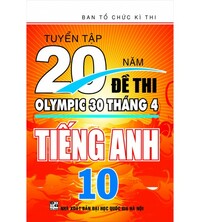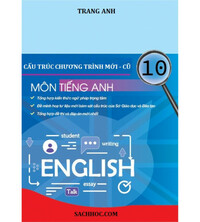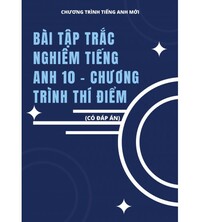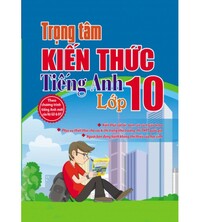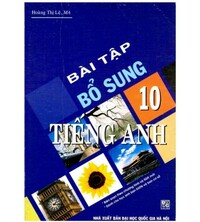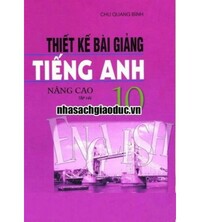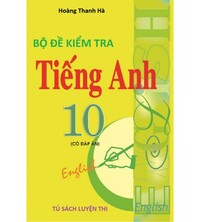Đề thi học kì 1 Tiếng Anh 10 iLearn Smart World - Đề số 5
Section 1: You will hear Harry talking to Lisa about his holiday. What activity did he do each day? Section 2: Find the word which has a different sound in the part underlined. Section 3: Choose the word which has a different stress pattern from the others. Section 4: Choose the best answer A, B, C or D to complete the sentences. Section 5: Mark the letter A, B, C, or D to indicate the word(s) CLOSEST in meaning to the underlined word(s) in each of the following sentences.
Đề bài
LISTENING
Section 1: You will hear Harry talking to Lisa about his holiday. What activity did he do each day?
|
1. Saturday 2. Sunday 3. Monday 4. Tuesday 5. Wednesday |
A. swimming B. going to the cinema C. sailing D. playing online games E. windsurfing F. shopping G. sightseeing H. walking |
PHONETICS
Section 2: Find the word which has a different sound in the part underlined.
6.
A. receipt
B. receive
C. leisure
D. foreign
7.
A. quality
B. charity
C. marathon
D. manager
Section 3: Choose the word which has a different stress pattern from the others.
8.
A. warranty
B. aerobics
C. determine
D. canoeing
9.
A. easygoing
B. personality
C. unreliable
D. temporary
USE OF ENGLISH
Section 4: Choose the best answer A, B, C or D to complete the sentences.
10. Many people from all over Italy volunteered __________ part in the search and rescue operations and __________ the survivors of the earthquake of 2009.
A. to be taking - aided
B. to take - to aid
C. having taken - aiding
D. taking - to be
11. The man sitting next to me at the theatre got so bored that he couldn’t help __________ throughout the whole performance of Shakespeare’s Troilus and Cressida.
A. yawning
B. to yawn
C. having yawned
D. to be yawning
12. I deeply regret __________ to her so severely yesterday. She was badly hurt.
A. to be speaking
B. to speak
C. having spoken
D. being spoken
13. Internet is a very fast_______ convenient way for us to get information.
A. and
B. or
C. but
D. yet
14. _______ we lived in town, we often went to the theater.
A. After
B. When
C. For
D. Or
15. Despite its smaller size, the Indian Ocean______ the Atlantic Ocean.
A. as deep as
B. is the same deep as
C. deeper as
D. is as deep as
16. Can Tho is______ from Saigon than Bien Hoa is.
A. farther
B. further
C. far
D. farer
17. A supermarket is______ a shopping centre.
A. less convenient as
B. not so convenient than
C. less convenient than
D. the most convenient as
18. Computer are considered as ______ tools today.
A. much modern than
B. the most modern
C. modern as
D. more modern
19. The teacher told us that Columbus ________ America in 1942.
A. discovered
B. had discovered
C. was discovering
D. would discover
20. They asked me when __________________________.
A. did I arrive
B. will I arrive
C. I had arrived
D. I can arrive
Section 5: Mark the letter A, B, C, or D to indicate the word(s) CLOSEST in meaning to the underlined word(s) in each of the following sentences.
21. A series of ingenious inventions in Britain provided the impetus for the Industrial Revolution.
A. clever
B. minor
C. mechanical
D. intricate
22. The removal of cataracts in the eyes by laser has become a common procedure.
A. method
B. belief
C. improvement
D. regulations
Section 6: Mark the letter A, B, C, or D to indicate the word(s) OPPOSITE in meaning to the underlined word(s) in each of the following sentences.
23. Computers are recent accomplishments in our time.
A. achievements
B. failures
C. deeds
D. inventions
24. I wonder if I would answer the following personal questions.
A. individual
B. private
C. public
D. owned
Section 7: Mark the letter A, B, C or D to indicate the underlined part that needs correction in each off the following questions.
25. It would be both noticed and appreciating if you could finish the work before you leave.
A. both
B. appreciating
C. the work
D. leave
26. Paris is much more exciting as I expected.
A. much
B. exciting
C. as
D. expected
27. The teacher asked him why hadn’t he done his homework, but he said nothing.
A. why
B. hadn’t he done
C. but
D. said nothing
Section 8: Choose the sentences or phrases that best complete these conversations.
28. Alex: _______________________________
Bobby: The weather was terrible, so I decided not to.”
A. Have you ever seen a tornado?
B. So, what was it like in France?
C. Did you notice how lovely it was today?
D. Why didn‘t you play football today?
29. Sam: _______________________________
Peter: “I‘m not sure, but I‘m interested in ancient history.”
A. Are you really interested in ancient history?
B. What kind of books do you normally buy?
C. What do you want to study at university?
D. Have you ever visited any ancient ruins?
30. Rose: _________________________________
Jack: Lauren will be picking me up in the morning at the corner
A. Are you going to the company reception with anyone?
B. Will you be leaving early for the party?
C. Who is going to drive you there tomorrow?
D. Have you arranged for Lauren to accompany you to the party?
READING COMPREHENSION
Section 9: Choose the word or phrase among A, B, C or D that best fits the blank space in the following passage.
Ella Fitzgerald
Ella Fitzgerald, the great American jazz singer, was born in Virginia in 1917. She moved to New York when she was a young child.
When Ella was fifteen her mother died, and she went to live with her aunt. This was a hard time in her life and she got into (31) …………. with the police. She (32) …………. money from singing on the street and people started to notice her.
In 1934, she won first prize in a competition, and she (33) …………. a well-known band. By 1938 she was famous and her songs were the best-selling recordings of the time.
Fitzgerald starred in films and appeared in many television shows. She also went on (34) …………. around the world. She died in 1996. In the (35) …………. of many people, she is the greatest ever jazz singer.
31.
A. problem
B. danger
C. trouble
32.
A. won
B. made
C. took
33.
A. became
B. played
C. joined
34.
A. tour
B. guide
C. concert
35.
A. idea
B. opinion
C. thought
Section 10: For each question, write the correct answer. Write ONE word for each gap.
|
From: Jonathan To: Peter Dear Peter, I hope you are well. I am writing to tell you some news. Amanda and I are getting married in (36) ………… summer and we (37) ………… love you to come. We have lots of plans! The wedding (38) ………… be in June. We are (39) ………… to have a big party afterward at my parents’ house. We have invited hundreds (40) ………… guests. I know you live far away, but the house has a spare room and you can stay here for a few days. Please (41) ………… me know if you can come. Jonathan |
WRITING
Section 11: Rewrite the following sentences, using the suggestions.
42. Steve didn't manage to complete his work. (FAILED)
Steve_________________________________
43. How long has she been studying English? (BEGIN)
When ________________________________
44. George wrote his last novel five years ago. (WAS)
It ___________________________________
45. I'm sorry I didn't go to college. (REGRET)
I _____________________________________
----- HẾT -----
Đáp án
HƯỚNG DẪN GIẢI
Thực hiện: Ban chuyên môn

42. Steve failed to complete his work.
43. When did she begin studying English?
44. It was five years ago that/when George wrote his last novel.
45. I regret not going/not having gone to college.
HƯỚNG DẪN GIẢI CHI TIẾT
Transcript:
Lisa: Hello, Harry. Did you have a good holiday?
Harry: Yes. It was really good. I spent five days at a friend’s house in France.
Lisa: Really?
Harry: Well, my friend lives in the countryside, near a lake, so when I first arrived on Saturday, we went out on his boat.
Lisa: Fantastic! I’ve never been sailing. Did you swim as well?
Harry: Not on Saturday, but on Sunday we went back to the lake. I don’t usually like swimming much, but the water was lovely.
Lisa: What else did you do?
Harry: Well, on Monday, we went off to the hills.
Lisa: I love walking.
Harry: Yes. It was really good. Then on Tuesday, we were tired, so we stayed at home. We played some online games.
Lisa: What about your last day?
Harry: It was sunny on Wednesday, and I wanted to go windsurfing, but we went shopping instead.
Lisa: Did you buy me a present?
Harry: Well, no, but I sent you a postcard.
Lisa: Well, I haven’t got it yet!
1. C
Kiến thức: Nghe – hiểu chi tiết
Thông tin:
Harry: Well, my friend lives in the countryside, near a lake, so when I first arrived on Saturday, we went out on his boat.
(À, bạn của tôi sống ở vùng nông thôn, gần một cái hồ, vì vậy khi tôi mới đến vào thứ Bảy, chúng tôi đã đi chơi trên thuyền của anh ấy.)
Lisa: Fantastic! I’ve never been sailing. Did you swim as well?
(Tuyệt vời! Tôi chưa bao giờ đi thuyền. Bạn cũng đã bơi?)
Đáp án: Saturday – sailing (thứ Bảy – chèo thuyền)
2. A
Kiến thức: Nghe – hiểu chi tiết
Thông tin:
Harry: Not on Saturday, but on Sunday we went back to the lake. I don’t usually like swimming much, but the water was lovely.
(Không phải vào thứ Bảy, nhưng vào Chủ nhật, chúng tôi đã trở lại hồ. Tôi thường không thích bơi nhiều, nhưng nước rất dễ thương.)
Đáp án: Sunday – swimming (Chủ nhật – bơi)
3. H
Kiến thức: Nghe – hiểu chi tiết
Thông tin:
Harry: Well, on Monday, we went off to the hills.
(Chà, vào thứ Hai, chúng ta đã đi đến những ngọn đồi.)
Lisa: I love walking.
(Tôi thích đi bộ.)
Đáp án: Monday – walking (thứ Hai – đi bộ)
4. D
Kiến thức: Nghe – hiểu chi tiết
Thông tin:
Harry: Yes. It was really good. Then on Tuesday, we were tired, so we stayed at home. We played some online games.
(Vâng. Nó thực sự tốt. Rồi đến thứ Ba, chúng tôi mệt nên ở nhà. Chúng tôi đã chơi một số trò chơi trực tuyến.)
Đáp án: Tuesday – playing online games (thứ Ba – chơi trò chơi trực tuyến)
5. F
Kiến thức: Nghe – hiểu chi tiết
Thông tin: It was sunny on Wednesday, and I wanted to go windsurfing, but we went shopping instead.
(Vào thứ Tư, trời nắng và tôi muốn đi lướt ván, nhưng thay vào đó chúng tôi đã đi mua sắm.)
Đáp án: Wednesday – shopping (thứ Tư – mua sắm)
6. D
Kiến thức: Phát âm “ei”
Giải thích:
A. receipt /rɪˈsiːt/
B. receive /rɪˈsiːv/
C. leisure /ˈleʒə(r)/ hoặc / /ˈliːʒər/
D. foreign /ˈfɒrən/
Phương án D có phần gạch chân đọc là /ə/, còn lại đọc là /i:/.
Chọn D.
7. A
Kiến thức: Phát âm “a”
Giải thích:
A. quality /ˈkwɒləti/
B. charity /ˈtʃærəti/
C. marathon /ˈmærəθən/
D. manager /ˈmænɪdʒə(r)/
Phương án A có phần gạch chân đọc là /ɒ/, còn lại đọc là /æ/.
Chọn A.
8. A
Kiến thức: Trọng âm từ 3 âm tiết
Giải thích:
A. warranty /ˈwɒrənti/
B. aerobics /eəˈrəʊbɪks/
C. determine /dɪˈtɜːmɪn/
D. canoeing /kəˈnuːɪŋ/
Phương án A có trọng âm rơi vào 1, còn lại rơi vào 2.
Chọn A.
9. D
Kiến thức: Trọng âm từ đa âm tiết
Giải thích:
A. easygoing /ˌiːzi ˈɡəʊɪŋ/
B. personality /ˌpɜːsəˈnæləti/
C. unreliable /ˌʌnrɪˈlaɪəbl/
D. temporary /ˈtemprəri/hoặc /ˈtempəreri/
Phương án D có trọng âm rơi vào 1, còn lại rơi vào 3.
Chọn D.
10. B
Kiến thức: Dạng của động từ
Giải thích:
volunteer to do sth: tình nguyện làm gì
Cấu trúc song song: to-V and to-V
Many people from all over Italy volunteered to take part in the search and rescue operations and to aid the survivors of the earthquake of 2009.
(Nhiều người từ khắp nước Ý đã tình nguyện tham gia tham gia các hoạt động tìm kiếm và cứu hộ và hỗ trợ những người sống sót sau trận động đất năm 2009.)
Chọn B.
11. A
Kiến thức: Dạng của động từ
Giải thích:
couldn’t help doing sth: ghét cái gì
The man sitting next to me at the theatre got so bored that he couldn’t help yawning throughout the whole performance of Shakespeare’s Troilus and Cressida.
(Người đàn ông ngồi cạnh tôi ở nhà hát đã chán đến mức không thể ngừng ngáp trong suốt toàn bộ buổi biểu diễn của Shakespeare’sTroilus và Cressida.)
Chọn A.
12. C
Kiến thức: Dạng của động từ
Giải thích:
regret doing sth/having done sth: hối tiếc vì đã làm gì
I deeply regret having spoken to her so severely yesterday. She was badly hurt.
(Tôi vô cùng hối hận vì đã nói năng lời với cô ấy vào ngày hôm qua. Cô ấy đã bị tổn thương nặng nề.)
Chọn C.
13. A
Kiến thức: Liên từ
Giải thích:
A. and: và
B. or: hoặc
C. but: nhưng
D. yet: nhưng
Internet is a very fast and convenient way for us to get information.
(Internet là một cách rất nhanh và thuận tiện để chúng tôi có được thông tin.)
Chọn A.
14. B
Kiến thức: Liên từ
Giải thích:
A. After: Sau khi
B. When: Khi mà
C. For: vì, cho
D. Or: Hoặc
When we lived in town, we often went to the theater.
(Khi mà chúng tôi sống ở thị trấn, chúng tôi thường đến rạp hát.)
Chọn B.
15. D
Kiến thức: Cấu trúc so sánh
Giải thích:
Cấu trúc so sánh bằng:
(a) be + as/so + adj + as
(b) the same as + N + as ( đáp án B loại vì “deep” là tính từ)
Despite its smaller size, the Indian Ocean is as deep as the Atlantic Ocean.
(Mặc dù kích thước nhỏ hơn, Ấn Độ Dương có độ sâu bằng Đại Tây Dương.)
Chọn D.
16. A
Kiến thức: Phân biệt “farther” và “furthur”
Giải thích:
farther dùng để chỉ về khoảng cách vật lý (chiều dài con đường, ki lô mét, cen ti mét…)
further dùng để chỉ về cả khoảng cách vật lý và khoảng cách trừu tượng (không gian, thời gian, tầm nhìn, chiến lược, tri thức…)
Can Tho is farther from Saigon than Bien Hoa is.
(Cần Thơ thì xa Sài Gòn hơn so với Biên Hòa.)
Chọn A.
17. C
Kiến thức: Cấu trúc so sánh
Giải thích:
A. less convenient as (x) ( cấu trúc đúng: less…than…)
B. not so convenient than (x) ( cấu trúc đúng: not so…..as)
C. less convenient than => đúng
D. the most convenient as (x) ( cấu trúc đúng: the most + adj….)
A supermarket is less convenient than a shopping centre.
(Siêu thi thì ít thuận lợi hơn so với trung tâm mua sắm.)
Chọn C.
18. B
Kiến thức: Cấu trúc so sánh
Giải thích:
Dựa vào nghĩa, áp dụng cấu trúc so sánh nhất: the + most + adj dài (modern)
Computer are considered as modern as tools today.
(Máy tính được coi là công cụ hiện đại nhất ngày nay.)
Chọn B.
19. A
Kiến thức: Câu tường thuật
Giải thích:
Không lùi thì khi thuật lại các sự kiện lịch sử có mốc thời gian cụ thể
The teacher told us that Columbus discovered America in 1942.
(Giáo viên nói rằng Columbus tìm ra châu Mĩ vào năm 1942.)
Chọn A.
20. C
Kiến thức: Câu tường thuật
Giải thích:
Cấu trúc tường thuật câu hỏi: S + asked + O + từ để hỏi + S + V (lùi thì)
They asked me when I had arrived.
(Họ hỏi tôi rằng khi nào tôi đến.)
Chọn C.
21. A
Kiến thức: Từ đồng nghĩa
Giải thích:
ingenious (adj) tài tình
A. clever (adj) thông minh
B. minor (adj) nhỏ
C. mechanical (adj) thuộc về động cơ, máy móc
D. intricate (adj) phức tạp
A series of ingenious inventions in Britain provided the impetus for the Industrial Revolution.
(Một loạt các phát minh tài tình ở Anh đã tạo động lực cho Cách mạng Công nghiệp.)
Chọn A.
22. A
Kiến thức: Từ đồng nghĩa
Giải thích:
procedure (n) phương pháp/ cách thức
A. method (n) phương pháp, cách thức
B. belief (n) niềm tin
C. improvement (n) sự cải thiện
D. regulations (n) luật lệ
The removal of cataracts in the eyes by laser has become a common procedure.
(Việc loại bỏ đục thủy tinh thể trong mắt bằng tia laser đã trở thành một thủ thuật phổ biến.)
Chọn A.
23. A
Kiến thức: Từ trái nghĩa
Giải thích:
Accomplishments (n) thành tựu
A. achievements (n) thành tựu, thành quả đạt được
B. failures (n) sự thất bại
C. deeds (n) hành động, nghĩa cử
D. inventions (n) sự phát minh
Computers are recent accomplishments in our time.
(Tôi tự hỏi liệu tôi có trả lời những câu hỏi cá nhân sau đây không.)
Chọn A.
24. C
Kiến thức: Từ trái nghĩa
Giải thích:
personal (adj) thuộc về cá nhân
A. individual (adj) cá nhân
B. private (adj) riêng tư
C. public (adj) công khai
D. owned (V-ed) sở hữu
I wonder if I would answer the following personal questions.
(Tôi tự hỏi nếu tôi sẽ trả lời các câu hỏi cá nhân sau đây.)
Chọn C.
25. B
Kiến thức: Từ loại
Giải thích:
Cấu trúc bị động: be + PII
Sửa: appreciating => appreciated
It would be both noticed and appreciated if you could finish the work before you leave.
(Sẽ được cả chú ý lẫn cảm kích nếu bạn có thể hoàn thành công việc trước khi rời đi.)
Chọn B.
26. C
Kiến thức: Cấu trúc so sánh
Giải thích:
more + adj-dài + than
Sửa: as => than
Paris is much more exciting than I expected.
(Paris thú vị hơn nhiều như tôi mong đợi.)
Chọn C.
27. B
Kiến thức: Câu tường thuật
Giải thích:
Cấu trúc tường thuật câu hỏi: S + asked + O + từ để hỏi + S + V (lùi thì)
Sửa: hadn’t he done => he hadn’t done
The teacher asked him why he hadn’t done his homework, but he said nothing.
(Giáo viên hỏi anh ấy vì sao anh ấy không làm bài tập về nhà, nhưng anh ấy không nói gì.)
Chọn B.
28. D
Kiến thức: Tình huống giao tiếp
Giải thích:
Alex: _______________________________
Bobby: Thời tiết thật kinh khủng, vì vậy tôi quyết định không làm vậy ”.
A. Bạn đã bao giờ nhìn thấy một cơn lốc xoáy chưa?
B. Vậy, cuộc sống ở Pháp như thế nào?
C. Bạn có nhận thấy nó đáng yêu như thế nào hôm nay không?
D. Tại sao bạn không chơi bóng đá hôm nay?
Chọn D.
29. C
Kiến thức: Tình huống giao tiếp
Giải thích:
Sam: _______________________________
Peter: Tôi không chắc, nhưng tôi quan tâm đến lịch sử cổ đại.
A. Bạn có thực sự quan tâm đến lịch sử cổ đại không?
B. Loại sách bạn thường mua là gì?
C. Bạn muốn học gì ở trường đại học?
D. Bạn đã từng đến thăm di tích cổ đại nào chưa?
Chọn C.
30. C
Kiến thức: Tình huống giao tiếp
Giải thích:
Rose: _________________________________
Jack: Sáng mai Lauren sẽ đón tôi ở góc đường
A. Bạn có đi dự tiệc chiêu đãi của công ty với ai không?
B. Bạn sẽ về sớm cho bữa tiệc chứ?
C. Ai sẽ chở bạn đến đó vào ngày mai?
D. Bạn đã sắp xếp để Lauren đi cùng bạn đến bữa tiệc chưa?
Chọn C.
31. C
Kiến thức: Sự kết hợp từ
Giải thích:
get into trouble with sb: vướng vào rắc rối với ai
This was a hard time in her life and she got into trouble with the police.
(Đây là khoảng thời gian khó khăn trong cuộc đời cô và bà đã gặp rắc rối với cảnh sát.)
Chọn C.
32. B
Kiến thức: Sự kết hợp từ
Giải thích:
make money (from doing sth): kiếm tiền
She made money from singing on the street and people started to notice her.
(Bà ấy kiếm tiền từ việc đi hát trên đường phố và mọi người bắt đầu chú ý đến bà ấy.)
Chọn B.
33. C
Kiến thức: Sự lựa chọn từ
Giải thích:
A. became: trở thành
B. played: chơi
C. joined: tham gia vào
In 1934, she won first prize in a competition, and she joined a well-known band.
(Năm 1934, bà giành giải nhất trong một cuộc thi, và bà tham gia một ban nhạc nổi tiếng.)
Chọn C.
34. A
Kiến thức: Sự kết hợp từ
Giải thích:
go on tour: đi lưu diễn
She also went on tour around the world.
(Bà cũng đã đi lưu diễn vòng quanh thế giới.)
Chọn A.
35. B
Kiến thức: Sự kết hợp từ
Giải thích:
at the thought of: nghĩ đến việc gì
in the opinion of: theo quan điểm, ý kiến của
In the opinion of many people, she is the greatest ever jazz singer.
(Theo ý kiến của nhiều người, bà ấy là ca sĩ nhạc jazz vĩ đại nhất từ trước đến nay.)
Chọn B.
Dịch bài đọc:
Ella Fitzgerald
Ella Fitzgerald, ca sĩ nhạc jazz vĩ đại của Mỹ, sinh ra ở Virginia năm 1917. Bà chuyển đến New York khi còn nhỏ.
Khi Ella mười lăm tuổi, mẹ bà qua đời và bà đến sống với dì của mình. Đây là khoảng thời gian khó khăn trong cuộc đời bà và bà đã gặp rắc rối với cảnh sát. bà ấy kiếm tiền từ việc đi hát trên đường phố và mọi người bắt đầu chú ý đến bà ấy.
Năm 1934, bà giành giải nhất trong một cuộc thi, và bà tham gia một ban nhạc nổi tiếng. Đến năm 1938, bà đã nổi tiếng và những bài hát của bà là những bản thu âm bán chạy nhất lúc bấy giờ.
Fitzgerald đóng phim và xuất hiện trong nhiều chương trình truyền hình. bà cũng đã đi lưu diễn vòng quanh thế giới. Bà mất năm 1996. Theo ý kiến của nhiều người, bà là ca sĩ nhạc jazz vĩ đại nhất từ trước đến nay.
36. the
Kiến thức: Sự lựa chọn từ
Giải thích:
in + the + mùa
Amanda and I are getting married in (36) the summer…
(Amanda và tôi dự định kết hôn vào mùa hè)
Đáp án: the
37.
Kiến thức: Sự lựa chọn từ
Giải thích:
would love/like sb to do sth = want sb to do sth: muốn ai làm gì
… and we (37) would love you to come.
(và chúng tôi mong bạn sẽ đến)
Đáp án: would
38. will
Kiến thức: Sự lựa chọn từ
Giải thích:
will + V (bare): dùng thì tương lai đơn để diễn tả sự kiện nào đó có thể xảy ra trong tương lai
The wedding (38) will be in June.
(Hôn lễ sẽ diễn ra vào tháng Sáu.)
Đáp án: will
39. going
Kiến thức: Sự lựa chọn từ
Giải thích:
is/am/are + going to + V(bare: dùng thì tương lai gần dể diễn tả kế hoạch, dự định
We are (39) going to have a big party afterward at my parents’ house.
(Chúng tôi dự định có bữa tiệc lớn phía sau nhà của bố mẹ.)
Đáp án: going
40. of
Kiến thức: Sự lựa chọn từ
Giải thích:
hundreds of + N số nhiều: hàng tram
We have invited hundreds (40) of guests.
(Chúng tôi mời hàng trăm vị khách.)
Đáp án: of
41. let
Kiến thức: Sự lựa chọn từ
Giải thích:
let sb know: để cho ai biết
Please (41) let me know if you can come.
(Vui lòng cho tôi biết rằng bạn có thể đến hay không nhé.)
Đáp án: let
Tạm dịch:
Từ: Jonathan
Tới: Peter
Peter thân mến,
Tôi hy vọng bạn khỏe. Tôi viết thư này để cho bạn biết một số tin tức. Amanda và tôi sẽ kết hôn vào mùa hè và chúng tôi rất muốn bạn đến. Chúng tôi có rất nhiều kế hoạch! Đám cưới sẽ diễn ra vào tháng 6. Sau đó chúng tôi sẽ tổ chức một bữa tiệc lớn tại nhà bố mẹ tôi. Chúng tôi đã mời hàng trăm khách. Tôi biết bạn ở xa, nhưng nhà còn dư phòng, bạn có thể ở đây vài ngày.
Xin vui lòng cho tôi biết nếu bạn có thể đến.
Jonathana
42.
Kiến thức: Cấu trúc tương đương
Giải thích:
didn’t manage to do sth (không giải quyết được việc gì) = failed to do sth (không thành công trong việc gì)
Steve didn't manage to complete his work.
(Steve đã không thể hoàn thành công việc của mình.)
Đáp án: Steve failed to complete his work.
43.
Kiến thức: Cấu trúc tương đương
Giải thích:
How long + has/have + S + Ved/V3 (mất bao lâu làm gì)
= When + did + S + begin/start + Ving ( bắt đầu từ khi nào)
How long has she been studying English?
(Cô ấy đã học tiếng Anh bao lâu rồi?)
Đáp án: When did she begin studying English?
(Cô ấy bắt đầu học tiếng Anh khi nào?)
44.
Kiến thức: Cấu trúc tương đương
Giải thích:
S + Ved/V2 + khoảng thời gian + ago
= It + be + khoảng thời gian + that/when + S + Ved/V2
George wrote his last novel five years ago.
(George đã viết cuốn tiểu thuyết cuối cùng của mình cách đây 5 năm.)
Đáp án: It was five years ago that/when George wrote his last novel.
(Cách đây 5 năm khi mà George viết quyển tiểu thuyết cuối cùng của mình.)
45.
Kiến thức: Cấu trúc tương đương
Giải thích:
regret (not) doing/having done sth: hối tiếc vì đã (không) làm gì
I'm sorry I didn't go to college.
(Tôi rất tiếc tôi đã không học đại học.)
Đáp án: I regret not going/not having gone to college.
(Tôi hối tiếc vì tôi đã không học đại học.)
Search google: "từ khóa + timdapan.com" Ví dụ: "Đề thi học kì 1 Tiếng Anh 10 iLearn Smart World - Đề số 5 timdapan.com"
